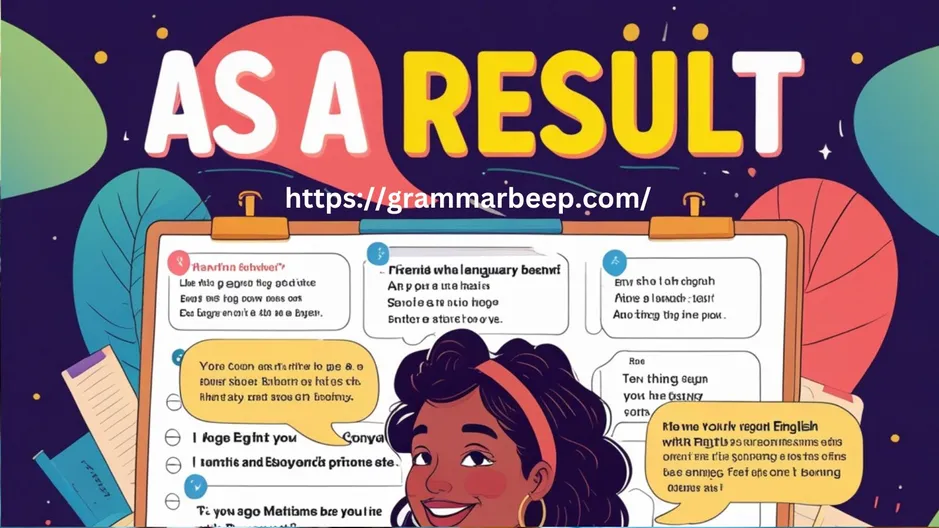20 Other Ways to Say “As a Result” can instantly elevate your writing from repetitive to refined. Whether you’re drafting an email, a business report, or even a casual update, switching up your transition phrases keeps your message sharp and engaging. Using the same phrase too often weakens your impact—variety creates rhythm and clarity.
This guide brings you the best phrase alternatives to replace “as a result,” with real-life examples that feel natural and professional. You’ll strengthen your writing coherence, sharpen your tone, and master the art of expressing cause and effect without sounding robotic or redundant.
Consequently
Scenario: Business Email
Subject: Q2 Strategy Review
Hi Marcus,
The company didn’t meet its quarterly targets. Consequently, we’ll need to adjust our marketing spend and redirect focus toward higher-performing channels starting next week.
Warm regards,
Jenna
Consequently is one of the strongest formal writing connectors, ideal for business report phrases or academic summaries.
Therefore
Scenario: Project Update Email
Subject: Client Feedback Received
Hi Team,
We received final input from the client. They’re happy with the direction. Therefore, we can proceed with the production phase by Friday.
Cheers,
Alex
Therefore is widely used in academic writing language and professional communication, especially when drawing conclusions from evidence or data.
Hence
Scenario: Internal Memo
To: All Staff
Subject: Winter Closure Announcement
Dear All,
The roads were icy and are expected to remain so through the weekend. Hence, all departments will switch to remote operations starting tomorrow.
Best,
Admin Office
Hence is a solid choice for formal announcements and news reporting phrases. It offers a direct and polished way of explaining consequences.
Check out this: 20 Other Ways to Say “As Soon As Possible”
Thus
Scenario: Business Proposal
Subject: Cost Optimization Plan
Dear Tom,
The project was completed ahead of schedule, thus reducing our labor cost by 18%. We suggest reinvesting those savings into R&D initiatives.
Regards,
Sonia
Thus is a logical connector and one of the more academic-friendly transition phrases.
Owing to
Scenario: School Email
Subject: Holiday Announcement
Dear Parents,
Owing to continued rainfall and roadblock issues, the school declared a holiday tomorrow for all grades.
Stay safe,
Principal Martin
Use owing to when you need to highlight a direct reason and result relationship.
In Light of
Scenario: Event Management Email
Subject: Festival Postponement
Hello,
In light of recent events, including rising flood concerns, we’ve decided to reschedule the performance festival to next month.
Kind regards,
City Arts Team
In light of is ideal when you’re referring to updated information or recent events that prompt change.
Given That
Scenario: Team Briefing
Subject: Location Change
Hi Team,
Given that the weather forecast predicts heavy rain, the product launch has been moved indoors to Hall B.
Thanks,
Mia
This is a great conversational connector that works well in both business meeting vocabulary and emails.
On Account Of
Scenario: Sports Bulletin
Subject: Match Delay
Hi All,
The evening match has been postponed on account of the unexpected power outage at the stadium.
Regards,
Coach Terry
This phrase is a more informal alternative that works well in announcements or personal communication.
More for you: 21 Ways to Say ‘Congratulations to Both of You’
For This Reason
Scenario: Department Memo
Subject: New Remote Policy
Hello Team,
Several staff have reported longer commute delays this season. For this reason, we’re expanding the remote work policy through winter.
All the best,
HR Team
As Such
Scenario: Policy Update Email
Subject: Mask Policy Adjustment
Hi All,
The hospital recorded zero COVID cases for two months. As such, we are lifting the indoor mask requirement in common areas.
Stay healthy,
Dr. Lina Weston
Accordingly
- Function: Shows a logical step taken in response to earlier information.
- Tone: Formal, procedural.
- Example:
“The client requested a tighter timeline. Accordingly, the team is revising the project plan.”
As a Result
- Function: Highlights the direct outcome of a specific action or condition.
- Tone: Neutral-formal.
- Example:
“The server experienced a security breach. As a result, access will be restricted temporarily.”
Due to This
- Function: Emphasizes a cause-effect relationship, slightly more conversational than “as a result.”
- Tone: Professional but accessible.
- Example:
“The facility failed its energy audit. Due to this, we’re implementing new efficiency measures.”
You might also like: 22 Creative Ways to Say “Stay Tuned”
In Response To
- Function: Focuses on an action taken because of a situation or feedback.
- Tone: Strategic, formal.
- Example:
“In response to customer demand, we’ve expanded our weekend support hours.”
Consequently Speaking
- Function: Rare, but works for formal speech or emphasis in written summaries.
- Tone: Elevated, often rhetorical.
- Example:
“The partnership failed to meet expectations. Consequently speaking, future deals will require stricter oversight.”
For your interest: 21 Other Ways to Say “Happy New Year”
In Consequence
- Function: Formal alternative to “as a result,” used mostly in legal or historical contexts.
- Tone: Highly formal.
- Example:
“The supplier breached the agreement. In consequence, the contract was terminated.”
Following This
- Function: Indicates a direct sequence of events or actions taken.
- Tone: Narrative, professional.
- Example:
“A system outage occurred at 9 a.m. Following this, IT launched an investigation.”
For That Reason
- Function: Slightly more conversational version of “for this reason.”
- Tone: Friendly-professional.
- Example:
“The timeline is too short. For that reason, we’ll need to reduce the project scope.”
Resultantly
- Function: Formal and concise connector to indicate consequence.
- Tone: Academic or technical.
- Example:
“The test sample failed calibration. Resultantly, it was excluded from the study.”
Thereby
- Function: Indicates that one action caused another as a means or method.
- Tone: Formal, efficient.
- Example:
“The upgrade increased bandwidth, thereby improving video conferencing quality.”
Synonyms of “As a Result”
| Connector | Function | Tone | Example |
|---|---|---|---|
| Consequently | Shows cause-effect with emphasis | Strong formal | “We’ll need to adjust our marketing spend. Consequently, we’ll redirect focus next week.” |
| Therefore | Draws logical conclusions from prior information | Academic/professional | “They’re happy with the direction. Therefore, we can proceed with the production phase.” |
| Hence | Indicates a direct consequence or explanation | Formal, polished | “Roads are icy. Hence, all departments will switch to remote operations.” |
| Thus | Shows result with a logical or academic tone | Formal, academic | “Completed ahead of schedule, thus reducing labor cost by 18%.” |
| Owing to | Indicates the cause of an event | Formal, explanatory | “Owing to rainfall, the school declared a holiday.” |
| In light of | Shows response to new or recent developments | Professional, responsive | “In light of rising flood concerns, the festival is rescheduled.” |
| Given that | Indicates a known condition prompting action | Conversational, clear | “Given that it may rain, the launch has been moved indoors.” |
| On account of | Indicates reason or justification | Slightly informal | “Match postponed on account of the power outage.” |
| For this reason | Points to a conclusion or policy based on previous data | Neutral-formal | “Commute delays continue. For this reason, remote work is extended.” |
| As such | Connects previous statements to a resulting policy or change | Concise, professional | “Zero COVID cases reported. As such, indoor mask rules are lifted.” |
| Accordingly | Indicates a logical, procedural step | Highly formal | “Client requested a tighter timeline. Accordingly, the team revised the plan.” |
| As a result | Highlights the direct effect of an event | Neutral-formal | “Security breach occurred. As a result, access is restricted.” |
| Due to this | Emphasizes cause and effect with a softer tone | Professional, accessible | “The facility failed its audit. Due to this, efficiency measures were introduced.” |
| In response to | Shows an action taken as a reply to something | Strategic, formal | “In response to demand, we expanded weekend support.” |
| Consequently speaking | Adds rhetorical emphasis in formal summaries | Elevated, rhetorical | “The partnership failed. Consequently speaking, future deals need stricter oversight.” |
| In consequence | Very formal way to show a result, often legal/historical | Highly formal | “Supplier breached terms. In consequence, the contract was terminated.” |
| Following this | Highlights sequence after a specific event | Narrative, professional | “Outage at 9 a.m. Following this, IT launched an investigation.” |
| For that reason | Casual form of “for this reason” | Friendly-professional | “Timeline is too short. For that reason, we’ll reduce the scope.” |
| Resultantly | Formal connector for academic or technical consequences | Academic/techni-cal | “Test sample failed. Resultantly, it was excluded from the study.” |
| Thereby | Shows that one action causes another as a means or process | Formal, efficient | “Upgrade increased bandwidth, thereby improving call quality.” |
FAQs
Can I use these phrases in IELTS or TOEFL writing?
Yes, many of these formal English expressions are perfect for IELTS or TOEFL essays to show strong cause and effect.
Are all these phrases interchangeable in every context?
Not always—choosing the right phrase depends on tone, formality, and sentence structure.
Which phrase works best for everyday conversation?
Phrases like “on account of” or “given that” are more natural in casual conversation phrases.
Do these phrases help improve readability?
Yes, using varied sentence connectors makes writing easier to follow and improves writing style.
Can I use more than one in the same paragraph?
Absolutely, as long as it improves writing coherence and doesn’t feel repetitive.
Conclusion
20 Other Ways to Say “As a Result” helps you write with confidence and clarity. These expressions fit every style—formal English expressions or relaxed everyday talk. Each option makes your message sound more human and professional.
Using these logical connectors improves your tone, shows strong reason and result relationships, and avoids repetition. Whether in academic essays or work emails, the right phrase makes a big difference.

Zoey Alba is an experienced blogger and language enthusiast with a passion for helping readers master the art of grammar. With years of expertise in writing, editing, and content creation, Zoey shares practical tips and insightful advice to make grammar accessible for all. When she’s not writing, Zoey enjoys reading, learning new languages, and inspiring others to write with confidence.
